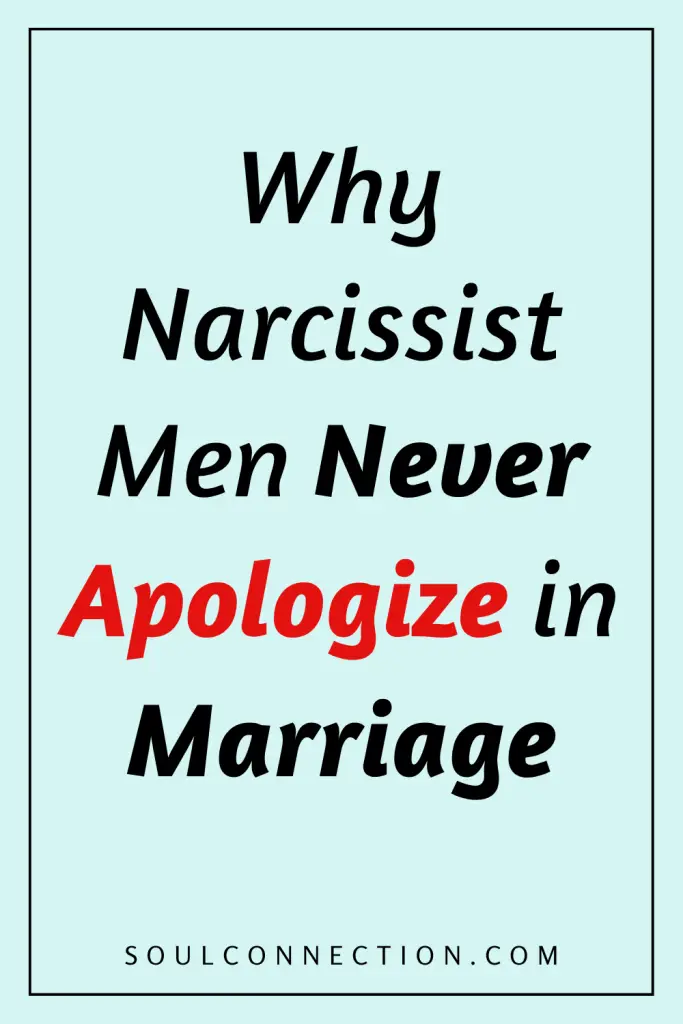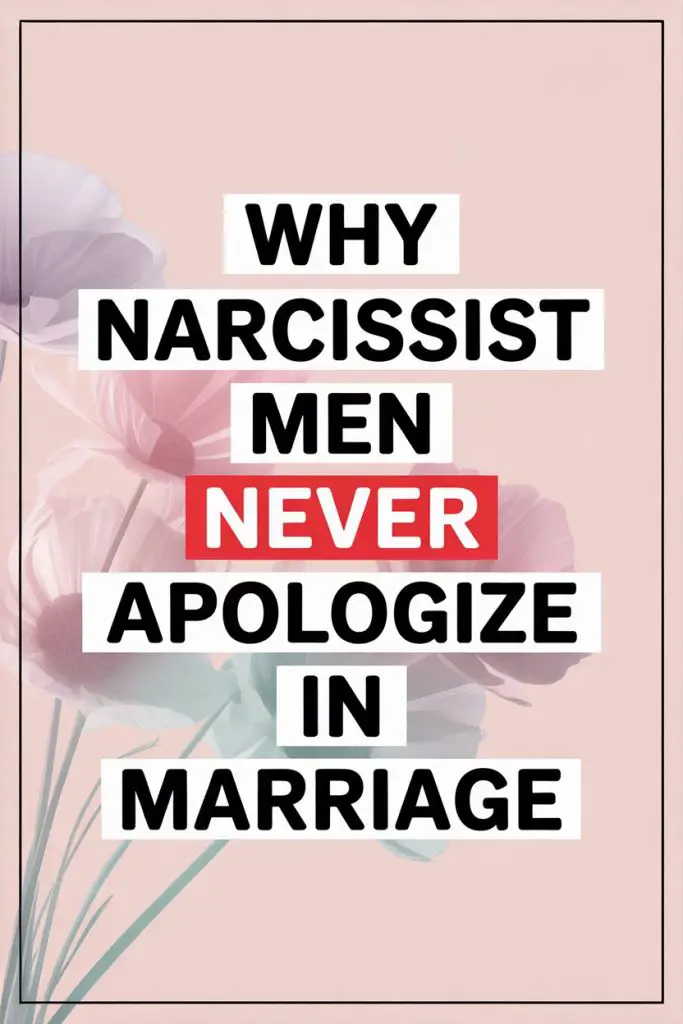Marriage to a narcissistic man can feel like arguing with a brick wall that occasionally demands praise for its sturdiness.
If you’ve ever waited for a heartfelt “I’m sorry” from a narcissistic partner, grab a snack—you’ll be hungry.
Why is that simple apology so elusive? Unwrapping this mystery offers not just catharsis, but a roadmap for your own sanity.
How the Narcissistic Mind Sees Apologies
For most people, apologizing might sting the ego, but it’s doable—like ripping off a plaster. For narcissists, it’s more like removing a limb.
The reason? Their self-worth is built on the shaky scaffolding of being right, special, infallible. Admitting to a fault isn’t just uncomfortable; it’s an existential crisis.
Picture a poker game where every chip is self-esteem, and the stakes are public humiliation. An apology would mean they’ve lost—something their psyche flat-out refuses.
In their mental user manual, “I’m sorry” doesn’t exist. If you’re looking for a moment of self-reflection, prepare to wait until pigs not only fly, but also submit flight plans.
Apologies = Weakness in Their Playbook
For the average person, an apology can be a sign of strength. For narcissists, it’s like walking onto a football pitch waving a white flag—and then handing the opposing team your boots.
Their worldview divides people into winners and losers, and only losers admit fault.
This twisted logic doesn’t just pop up in heated arguments. It bleeds into daily life—missed anniversaries, raising voices, forgotten chores—all become creative exercises in mental gymnastics.
Somehow, you end up apologizing for “making them” act that way.
The Art of Blame Deflection
Ever try to have a disagreement with a narcissist? Suddenly, you’re starring in an Olympic-level blame-shifting event. Narcissists are virtuosos at spinning reality to avoid accountability.
Missed dinner plans become your fault for not reminding them. Your feelings get dismissed as “too sensitive.” Their offensive comment? You “misunderstood.”
It’s exhausting, isn’t it? Each time you hope for that simple “I was wrong,” you get a dazzling fireworks show of projection, gaslighting, and self-pity. They’ll do a triple somersault to land the blame squarely in your lap.
Fear of Losing Control
Control is the oxygen of a narcissistic relationship. Apologizing hands over a slice of that control. It’s why apologies from a narcissist (if they ever happen) are rarer than a solar eclipse and just as fleeting.
Ever received a “sorry if you feel that way”? That’s not an apology; that’s a power play disguised as empathy. It shifts the focus away from their actions and back onto your reaction.
Such pseudo-apologies aren’t about healing the rift—they’re another tool to keep the upper hand.
The Ego’s Fragile Armor
Beneath the bravado, the narcissist’s ego is as fragile as a soap bubble in a hurricane. Every disagreement, every request for accountability, threatens to pop it.
Their entire sense of self is built on a foundation that must never admit to cracks.
Genuine remorse? That would mean looking in the mirror and seeing imperfection. In the rare event of a hint of regret, they stuff it down faster than a kid caught with their hand in the biscuit tin.
Self-examination is simply not on the menu.
Apologies and Their Relationship With Empathy
Apologizing takes empathy: the ability to see and feel another’s hurt. Narcissists, though, treat empathy the way a cat treats a bath—something to avoid at all costs.
Their emotional compass is tuned only to their own needs. Your pain registers only as an inconvenience, not as something they’ve caused.
Since empathy is in low supply, the very idea that their actions could hurt you doesn’t cross their mind—at least, not in a way that prompts genuine remorse.
Instead, you’ll get explanations of why you shouldn’t feel hurt, or why you’re overreacting. Warm and fuzzy, right?
The Role of Childhood and Upbringing
The seeds of narcissism are often planted early. Perhaps apologies were punished, or vulnerability mocked. Maybe their household rewarded bravado and perfection, but shamed weakness.
Over time, self-preservation morphed into a lifelong refusal to admit being wrong.
No, this doesn’t excuse the behavior—but it can help you understand why apologies are so hard-fought. You’re not up against just a stubborn adult; you’re sparring with a lifetime of emotional armor.
How This Impacts a Marriage
Living with a partner who never apologizes leaves wounds both big and small. Trust erodes. Resentment builds.
You start questioning your own reality—and might even find yourself apologizing for things you never did just to keep the peace. That’s not partnership; that’s emotional quicksand.
Intimacy and vulnerability (you know, the glue of marriage) shrivel when one person can’t ever admit fault. Over time, you grow apart, conversations become landmines, and true connection feels like a thing of the past.
Can a Narcissist Ever Learn to Apologize?
Change is possible, but don’t hold your breath for a Disney ending. Narcissists rarely seek help unless their world is falling apart or they stand to lose something precious—like you.
Even with therapy, the road is long and winding, and apologies may remain few and far between.
Still, some couples have found progress through boundaries, therapy, and a willingness to call out harmful behavior. Just don’t expect overnight miracles.
If you spot a genuine apology, cherish it—but keep your expectations realistic.
What You Can Do Tonight
Sick of walking on eggshells? You can take steps right now, even if your partner won’t change.
- Start naming behavior patterns instead of debating details. “You never apologize” is harder to twist than “You forgot my birthday.”
- Guard your boundaries fiercely. If your partner won’t own up, you don’t have to own their guilt.
- Seek outside support—friends, therapy, support groups. You’re not alone or crazy. Promise.
- Decide what you will and won’t accept. If you’re constantly starved for accountability, self-care isn’t selfish—it’s survival.
Your sanity is worth protecting, even if you’re married to someone who treats apologies like rare collector’s items.
Wrapping Up the Apology Mystery
Waiting for a narcissistic partner to apologize is the relationship equivalent of watching a kettle boil and realizing you forgot to fill it. The silence isn’t your fault—and it’s definitely not a reflection of your worth.
Empathy, accountability, and vulnerability are the lifeblood of strong marriages. When these are missing, you have every right to protect your spirit and draw your own boundaries.
Whether your partner ever learns to say “I’m sorry” is on them. Holding out for that single word shouldn’t cost you your peace.
And if you do ever hear a real apology? You might want to buy a lottery ticket—the odds are about the same.


